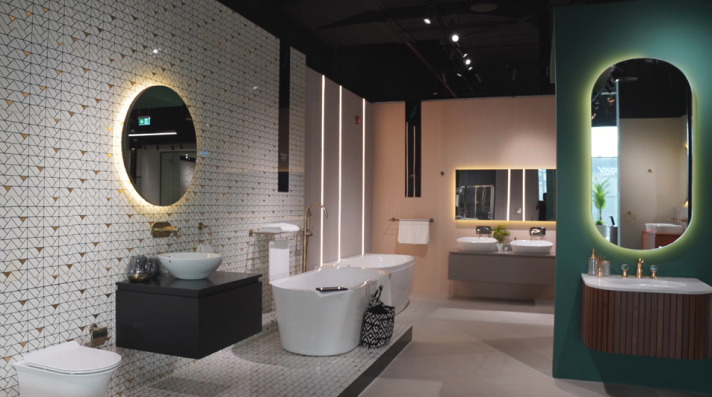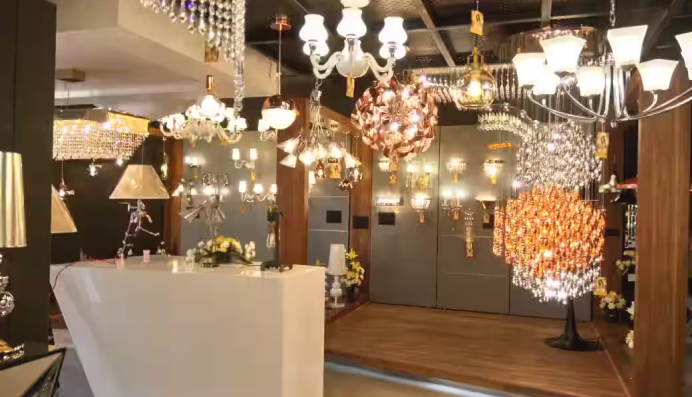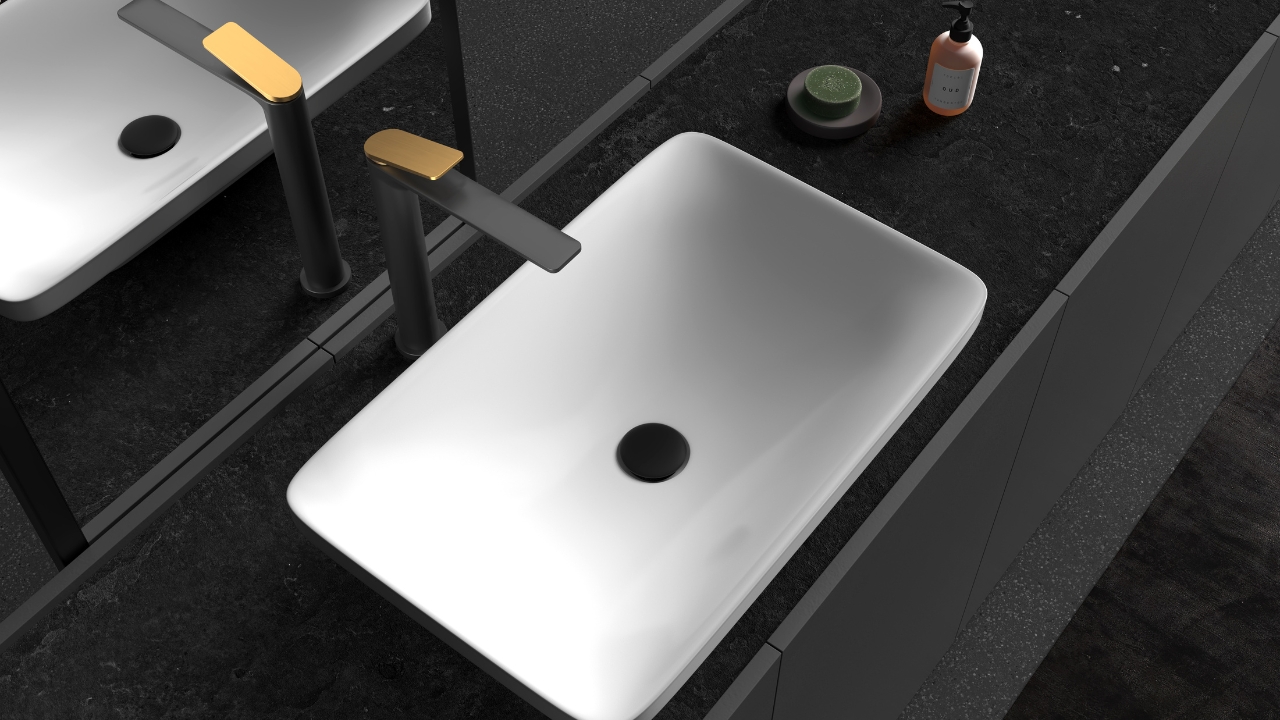Selecting the right faucet material is especially important if you live in a hard water area in India. Hard water contains high levels of minerals that can cause buildup and damage on faucet surfaces over time. Choosing a faucet made using a material that is resistant to hard water ensures your faucet will last longer and require less maintenance. Read on to learn about the top six faucet materials that can withstand the challenges posed by hard water in India.
Impacts of Hard Water on Faucets

Credits: Jaquar
Hard water creates several problems for faucets:
- Mineral deposits build up, reducing water flow.
- Limescale and staining occur on faucet surfaces.
- Corrosion and deterioration of material over time.
- Fixtures require frequent cleaning to remove deposits.
- Minerals get trapped under faucet aerators affecting performance.
Understanding these effects helps select ideal faucet materials.
Benefits of Choosing the Right Faucet Material
The proper faucet material makes a big difference in hard water areas by:
- Preventing staining, corrosion and wear from mineral deposits.
- Retaining shine and luster over lifetime of use.
- Requiring less frequent polishing or scrubbing to remove buildup.
- Maintaining optimal water flow rates without clogging.
- Extending overall longevity of faucet.
- Reducing need for repairs or replacement saving money.
Selecting faucet materials resistant to hard water saves time and hassle.
Faucet Materials Ideal for Hard Water Areas in India

Credits: Jaquar
Stainless Steel: Durable and Stylish
Stainless steel boasts:
- Highly resistant to corrosion from mineral deposits.
- Does not require special finishes or treatments.
- Easy to clean and polish keeping the faucet looking new.
- Withstands heavy use without significant wear.
- Available in bold contemporary styles.
Stainless steel holds up well against hard water conditions.
Brass: Timeless and Resistant
Brass features:
- Naturally corrosion and tarnish-resistant.
- Coatings like chrome or nickel further boost corrosion protection.
- Can develop attractive patina finish when uncoated.
- Strong and durable for lifelong performance.
- Lends well to elegant traditional decorative styles.
Brass makes a reliable choice in hard water environments.
Zinc Alloy: Affordable and Reliable

Credits: Jaquar
Zinc alloy combines strengths of:
- Corrosion resistance approaching that of brass.
- Stronger and longer-lasting than plastic.
- Takes chrome and other coatings well.
- Makes feasible stylish finishes at lower price points.
Zinc alloy delivers the appeal of metals on a budget.
Bronze: Robust and Vintage Look
Bronze offers unique advantages:
- Naturally develops a protective patina layer to deter corrosion.
- Earthy, vintage aesthetics.
- Can last decades with care.
- Solid yet easily cast into decorative shapes.
- Pairs well with natural material palettes.
Bronze develops character over time and resists hard water.
Copper: Natural Antimicrobial Properties
Copper features:
- Self-sanitizing copper ions fight biological growth.
- Naturally stunning warm metallic shine.
- Inherently corrosion resistant.
- Distinctive artistic styles not replicated by other metals.
- Sophisticated old-world luxury.
Naturally antimicrobial copper endures water exposures.
Nickel: Versatile and Wear-Resistant

Credits: Jaquar
Nickel plating's advantages:
- Harder than chrome enhancing wear resistance.
- Less prone to showing water spots.
- Used as a protective finish over brass, bronze, and other metals.
- Provides a warm grey metallic color.
- Works on traditional and contemporary styles.
Nickel finish boosts durability.
Other Smart Faucet Materials Options
Beyond metals, some other smart options exist:
Solid Brass - More expensive than plated brass but naturally corrosion proof with a gold hue.
Stainless Steel Alloys - Added elements like molybdenum boost corrosion protection.
Polymer-Based Materials - Acrylic, polypropylene and fiberglass are affordable, durable and corrosion-free.
Enameled Cast Iron - Molten glass bonded to iron makes scratch-proof, rust-proof faucet bodies.
With choices available, select the ideal faucet material matching budget with performance.
Protecting Faucets from Hard Water Damage

Credits: Jaquar
Implementing good maintenance habits prolongs faucet lifespans in hard water conditions:
- Wipe down after every use to prevent mineral residue from drying.
- Polish regularly using a product designed for the faucet's specific finish.
- Remove and clean faucet aerators frequently to prevent flow restrictions.
- Immediately replace washers at any sign of leakage to prevent corrosion spread.
- If possible, install water softening to remove minerals.
- Apply car wax to protect chrome and other finishes from etching.
Proper care keeps faucets working and looking their best.
Signs It's Time to Replace Hard Water Damaged Faucets
Look for these clues suggesting it may be time to replace rather than repair faucet:
- Visible cracks, pitting or corrosion on the surface.
- Leaks originating from inside faucets rather than washers.
- Significant loss of water pressure.
- Need to replace multiple internal parts at once.
- Mineral deposits and staining persist after repeated attempts to remove.
- Cost of repair parts approaching that of a new faucet.
Replacement restores optimal performance and visual appeal.
Safety Considerations for Choosing Faucet Materials

Credits: Jaquar
Certain material choices involve health factors to weigh:
- Lead content in older brass faucets makes them unsafe for drinking or cooking.
- Some plastics may leach bisphenol-A (BPA) into water with health impacts.
- Copper can leach into corrosive water but is generally safe in neutral pH.
- Be aware of country standards for faucet materials safety.
Prioritize safety - invest in certified lead-free faucets.
Design Styles for Hard Water Resistant Faucets
Durable faucet materials allow for an array of aesthetic styles:
Modern - Sleek silhouettes in stainless steel, chrome or matte black.
Traditional - Ornate shapes and engraving in bronze, brass, and nickel finishes.
Farmhouse - Rustic and rugged cast iron or aged brass designs.
Nautical - Polished chrome or stainless steel mimicking ship components.
Retro - Vintage silhouettes from past eras brought to life through tough materials.
Minimalist - Clean and simple geometric forms devoid of embellishment.
The right material provides flexibility to achieve your perfect faucet style.
Choosing Faucet Features

Credits: Jaquar
Optional features to enhance functionality and convenience:
Motion-Activated - Touchless activation for hands-free use.
Pull-Down Sprayer - Helpful for rinsing large items.
Multi-Function Sprayer - Different sprays at the flip of a switch.
Filtration - Built-in filter removes contaminants and purifies water.
Temperature Controls - Mixer valves or digital controls prevent scalding and adjust temperature.
Soap Dispenser - Conveniently integrated into faucet body.
Don't just consider looks - choose features that improve daily use.
Bathroom Faucet Types
Choose configurations to match your space:
Centerset Faucets - Combined handles, spout and base. Sits on counter.
Widespread Faucets - Separate spout and handles install spaced apart.
Wall-Mount Faucets - Faucet installs into wall rather than on counter or sink.
Single-Handle Faucets - One lever controls temperature and flow.
Vessel Faucets - Accommodate installation on tall vessel sinks with longer spouts.
Match the right faucet type with your existing sink setup.
Jaquar Faucets

Credits: Jaquar
At Jaquar, we understand the challenges posed by hard water. That’s why our faucets are meticulously crafted using materials like brass, zinc alloy, stainless steel, and copper- which are built to last through decades of use and resist hard water damage. Our specialized coatings provide further protection. Discover our diverse range of thoughtfully designed faucets, made to withstand your local water conditions while delivering a premium cleansing experience to your home. Contact Jaquar to find faucets tailored for the hard water needs of Indian households.
Conclusion
Hard water conditions present unique challenges that make choosing the right faucet materials crucial. Stainless steel, brass, bronze, copper, zinc alloy and nickel represent smart options that can better withstand mineral buildup and corrosion. Selecting durable, low-maintenance faucet materials extends the lifespan of your bathroom or kitchen faucet significantly. With finishes that retain luster along with sleek or vintage styling, you don't have to sacrifice aesthetics for functionality. Combine smart materials with convenient features, and a faucet in your desired configuration delivers lasting performance and appeal.


